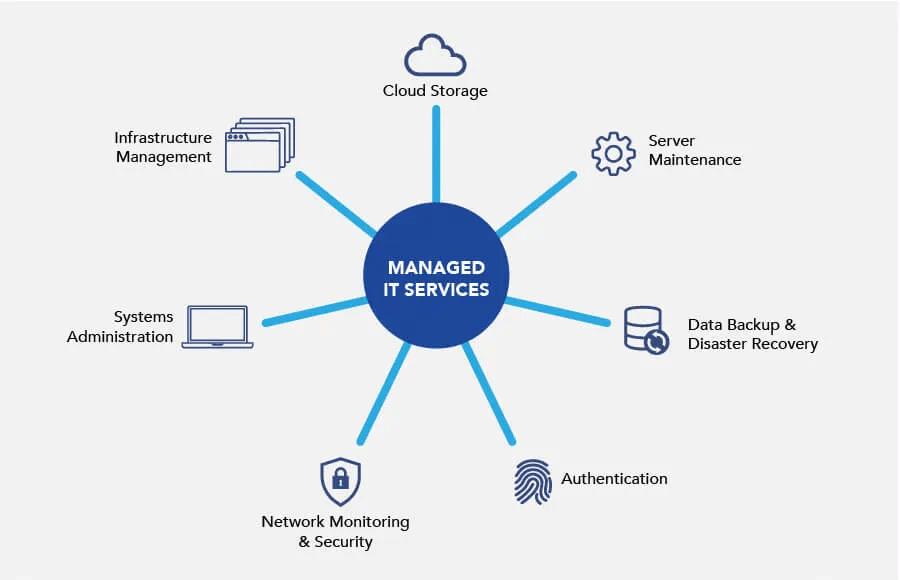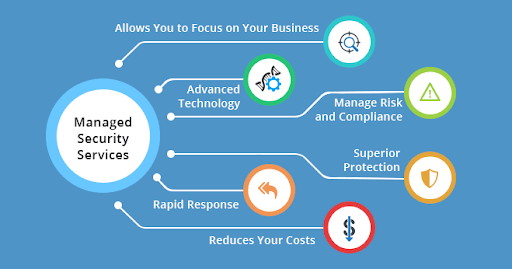Companies are looking for strong solutions to protect their important assets at a time when cyber threats are becoming more advanced and frequent. What are managed security services (MSS), and how may they support advanced threat protection? MSS gives companies professionally managed cybersecurity services to find, stop, and handle possible hazards. These managed security solutions not only improve the defense systems of a company but also help it concentrate on main business activities free from security concerns.
The article explores the advantages of managed IT security services, their function in managing advanced cyber threats, and how companies might use them to properly protect their digital environments.
What Are Managed Security Services?
First of all, let us consider what are security services in the framework of IT to grasp the relevance of MSS. Managed security services are a collection of cyber security management services offered by third-party businesses. On behalf of their customers, these vendors—also known as managed security services providers (MSSPs)—manage responsibilities including threat monitoring, incident response, vulnerability management, and compliance support.
MSSPs are becoming more and more sought after by companies for completely managed network and security services, which instantly protect against cyberattacks. Outsourcing these tasks allows companies to access professional management security solutions without having to keep an internal cybersecurity team in place.
The Growing Need for Managed Security Services
The landscape of current threats is always changing; hence conventional security policies can fall short. Among the advanced persistent threats (APTs), ransomware, and zero-day exploits are just a few of the complex attacks calling for special defenses. Managed cyber security services are therefore extremely important for:
1. Expertise: MSSPs use experienced staff to keep current on the latest security technologies and threats.
2. 24/7 Monitoring: Constant monitoring guarantees early detection and reduction of risks.
3. Cost Efficiency: Outsourcing cybersecurity managed services removes the need for costly internal infrastructure and expertise.
4. Compliance Support: MSSPs help companies with industry norms and laws, therefore lowering legal risks.
Benefits of Managed Security Services
The benefits of managed security services exceed simple threat detection and response. Let's investigate some main benefits:
1. Enhanced Threat Detection and Response
Using powerful analytics and machine learning managed security services cloud solutions find anomalies and react to threats in real time. By being proactive, experts reduce possible damage.
2. Scalability
Growing businesses need a more advanced security system to keep them protected. Managed IT services security guarantees flawless protection by readily scaling to fit additional assets, users, and locations.
3. Cost-Effectiveness
Establishing an in-house security staff can be quite costly. At a fraction of the cost, managed security companies provide a reasonably priced alternative giving enterprise-grade protection.
4. Availability of Innovative Technologies
For smaller companies, MSSPs provide access to the newest tools and technologies—threat intelligence systems, endpoint detection, and response solutions—which could be otherwise unaffordable.
5. Minimized Downtime
Companies suffer less disturbance and faster recovery times when managed cyber security service providers continuously monitor and reduce risks.
MSS and Advanced Threat Protection
Providing advanced threat protection (ATP) is among the most important functions of managed security systems. ATP covers a spectrum of approaches and tools used to stop, identify, and react to advanced cyber threats. MSS fits into this framework as follows:
1. Threat Intelligence
Global threat intelligence helps MSSPs keep ahead of new risks. Analyzing this information helps experts forecast possible attack paths and strengthen defenses early on.
2. Behavioral Analytics
Using behavioral analytics, cyber security managed service providers find unusual activities within networks. This helps spot potential breaches before they get more serious.
3. Incident Response
MSSPs offer quick reaction solutions to contain and fix the danger if a breach occurs. Their knowledge guarantees minimal effect on business processes.
4. Vulnerability Management
Regular vulnerability evaluations and patch management are fundamental to ATP. Managed services security providers spot and fix system vulnerabilities to stop exploitation.
5. Comprehensive Reporting
MSSPs produce comprehensive reports on compliance levels, incidents, and vulnerabilities. These insights enable companies to decide on their security posture with knowledge.
Types of Managed Security Services
Managed security services come in many different forms, tailored to specific organizational requirements. Among the most common types are:
1. Managed Network Security Services
These services focus on virtual private networks (VPNs), intrusion detection/prevention systems (IDS/IPS), and firewalls securing network infrastructure.
2. Managed Cloud Security Services
As the adoption of clouds increases, managed cloud security services monitor access limits, secure APIs, and guarantee compliance, safeguarding cloud environments.
3. Endpoint Security
Managed cyber security solutions comprise technologies for endpoint detection and response (EDR) to protect endpoints like laptops, cell phones, and IoT devices.
4. Email Security
Email remains a common attack vector. To guard communications, MSSPs offer malware scanning, phishing protection, and spam filtering.
5. Compliance Control
By ensuring all security actions meet industry requirements, MSSPs help companies follow GDPR, HIPAA, and PCI DSS.
Choosing the Right MSSP
Effective threat protection depends on choosing a suitable managed services security provider. Consider the following elements to decide:
1. Reputation: Look for MSSPs with a track record of success and glowing client reviews.
2. Customization: Ensure the vendor can specifically fulfill your demands by customizing their managed IT security services.
3. Scalability: As your company expands, choose a provider capable of scaling its offerings.
4. Certifications: Check to see if the MSSP possesses industry-standard certifications including SOC 2 or ISO 27001.
5. Support: Choose a service with dedicated account managers and 24/7 support.
Practical Success Stories
1. Preventing a Ransomware Attack
A mid-sized manufacturing company teamed with an MSSP for managed network security services. Before it could encrypt critical systems, the supplier saw and stopped a ransomware effort, saving the business millions in potential losses.
2. Securing a Remote Workforce
One financial services company used managed cybersecurity to protect its remote personnel during the COVID-19 pandemic. The MSSP implemented endpoint security policies and frequent vulnerability assessments to ensure seamless operations.
The Future of Managed Security Services
MSS will evolve along with changing cyber threats. The future trends for managed cybersecurity services include:
1. AI and Machine Learning
Advanced algorithms will improve threat detection and response capacities in artificial intelligence and machine learning.
2. Zero Trust Security
MSSPs will focus on implementing zero-trust models to reduce attack surfaces.
3. Integration with DevSecOps
Security will take center stage in development workflows, ensuring secure code from its inception.
4. Expansion of Cloud Security Services
As more companies migrate to the cloud, MSSPs will provide personalized managed cloud security services to handle specific challenges.
Improving Your Security Posture Using MSS
These days, managed security services are not just helpful but essential. They equip companies to confidently navigate the ever-changing threat landscape. MSSPs guarantee business continuity and offer the knowledge, tools, and proactive policies required to protect your key assets.
Call to Action
Proceed to protect your company in the next stage. Partner with a reputable managed security services provider today to have an unmatched defense against cyberattacks. Get in touch right now to explore personalized solutions—managed IT security services or cybersecurity managed services. Allow us to strengthen your defenses and provide peace of mind.







